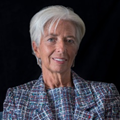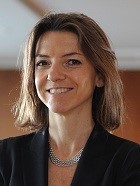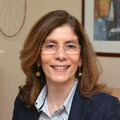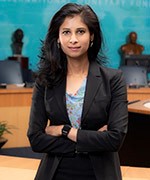Income Inequality Matters: How to Ensure Economic Growth Benefits the Many and Not the Few

IMF SEMINAR EVENT
DATE: April 13, 2019
DAY: Saturday
1:30 PM - 2:00 PM
LOCATION: IMF HQ1, Meetings Halls A&B (HQ1-3-430 A&B)
Overview
Achieving inclusive growth is one of the critical challenges of our time. Inequality has increased since the late 1980s in most advanced economies and remains high in most emerging markets and developing economies, despite the progress made in many of these countries. How can economic policies be designed to tackle inequality while avoiding or mitigating possible negative repercussions for efficiency and growth? How to foster inclusive growth?
Join the conversation via #InequalityMatters
Income Inequality Matters: How to Ensure Economic Growth Benefits the Many and Not the Few
SUMMARY
-
Aspects of inequality.
Goldberg
noted that inequality in advanced countries has been a major issue over
recent years, contributing to a loss of trust in institutions and
democracy, and a sense that the elite have captured all the gains at
the expense of the rest. She added that technology and globalization
have created disruptions which we have not dealt with very well. Boone highlighted that the critical issue is not just
inequality of income, but also inequality of opportunity and the fact
that inequality is reproducing itself. She noted that as the middle
class hollows out, social tensions increase.
- Polices to address inequality. Gopinath and the speakers agreed that addressing rising (domestic) inequality was a matter of urgency. Goldberg underscored that we need to think more proactively about redistribution policies. One important aspect of inequality, especially in the US, is that real wages have stagnated. Policy options include redistributive taxation, minimum wages (although often controversial), and direct labor market policies. There is also a geographical aspect to inequality, and Goldberg argued there is a need for policies that foster regional mobility. Boone suggested that digitalization could help solve this problem as people can remain local and work remotely. She also argued that there is scope to improve international taxation to ensure a level playing field and prevent corporations from “fishing for arbitrage” and encourage them to pay their fair share of taxes where they create value and employ people.
Panelists
Opening Remarks: Christine Lagarde
 Christine Lagarde is a French lawyer and politician who has been the Managing Director (MD) of the International Monetary Fund (IMF) since 5 July 2011. Previously, she held various, senior ministerial posts in the French government: she was Minister of Economic Affairs, Finance and Employment, Minister of Agriculture and Fishing and Minister of Trade in the government of Dominique de Villepin. An anti-trust and labour lawyer, Lagarde was the first female chair of major international law firm Baker &
McKenzie, between 1999 and 2004.
Christine Lagarde is a French lawyer and politician who has been the Managing Director (MD) of the International Monetary Fund (IMF) since 5 July 2011. Previously, she held various, senior ministerial posts in the French government: she was Minister of Economic Affairs, Finance and Employment, Minister of Agriculture and Fishing and Minister of Trade in the government of Dominique de Villepin. An anti-trust and labour lawyer, Lagarde was the first female chair of major international law firm Baker &
McKenzie, between 1999 and 2004.
Panelist: Laurence Boone

Laurence Boone is the OECD Chief Economist, G20 Finance Deputy and Head of the Economics Department.
Before joining the OECD, she was the Chief Economist at AXA Group, Global Head of Multi-Asset Client Solutions & Trading and Securities Finance, AXA Investment Managers, France; an independent director of Kering's board and remains a member of the Strategic committee of Agence France Trésor.
Prior to this, she was Special Advisor to the President of the French Republic; Chief Economist and Managing Director at Bank of America Merrill Lynch; Managing Director and Chief Economist France, Barclays Capital; Economist, OECD; Economist, CEPII, France and Quantitative Analyst for Merrill Lynch Asset Management.
She is a member of the Cercle des Economistes as well as of SDA Bocconi.
She taught at the École Polytechnique, ENSAE (the National School of Statistics) and the École Normale Supérieure and Sciences Po (Paris School of International Affairs).
She has a PhD in Applied Econometrics from the London Business School; a MSc in Econometrics & Macroeconomic Modelling from Reading University; a Master's Degree in Economics from Université Paris X Nanterre and a postgraduate diploma (DEA) in Modelling and Quantitative Analysis from University Paris X Nanterre.
Panelist: Pinelopi Koujianou Goldberg

Pinelopi “Penny” Koujianou Goldberg is the Chief Economist of the World Bank Group. She is on public service leave from Yale University, where she is the Elihu Professor of Economics. She is former Vice-President of the American Economic Association and President elect of the Econometric Society (for 2021). She is a member of the American Academy of Arts and Sciences, a recipient of both Guggenheim Memorial Foundation and Sloan Research Fellowships, and recipient of the Bodossaki Prize in Social Sciences. She is also a research associate at the National Bureau of Economics Research (NBER – currently on leave) and board member of the Bureau of Research and Economic Analysis of Development (BREAD). From 2011-2017 she was Editor-in-Chief of the American Economic Review. She has published widely in the areas of applied microeconomics, international trade, development, and industrial organization. She holds a Ph.D. from Stanford University and a Diplom from the University of Freiburg, Germany.
Panelist: Gita Gopinath
 Gita Gopinath is the Economic Counsellor and Director of the Research Department at the International Monetary Fund. She is on leave of public service from Harvard University’s Economics department where she is the John Zwaanstra Professor of International Studies and of Economics. She has authored numerous research articles on exchange rates, trade and investment, international financial crises, monetary policy, debt, and emerging market crises. She is the co-editor of the current Handbook of International Economics and was earlier the co-editor of the American Economic Review and managing editor of the Review of Economic Studies. She had also previously served as the co-director of the International Finance and Macroeconomics program at the NBER, and member of the economic advisory panel of the Federal Reserve Bank of New York.
Gita Gopinath is the Economic Counsellor and Director of the Research Department at the International Monetary Fund. She is on leave of public service from Harvard University’s Economics department where she is the John Zwaanstra Professor of International Studies and of Economics. She has authored numerous research articles on exchange rates, trade and investment, international financial crises, monetary policy, debt, and emerging market crises. She is the co-editor of the current Handbook of International Economics and was earlier the co-editor of the American Economic Review and managing editor of the Review of Economic Studies. She had also previously served as the co-director of the International Finance and Macroeconomics program at the NBER, and member of the economic advisory panel of the Federal Reserve Bank of New York.







